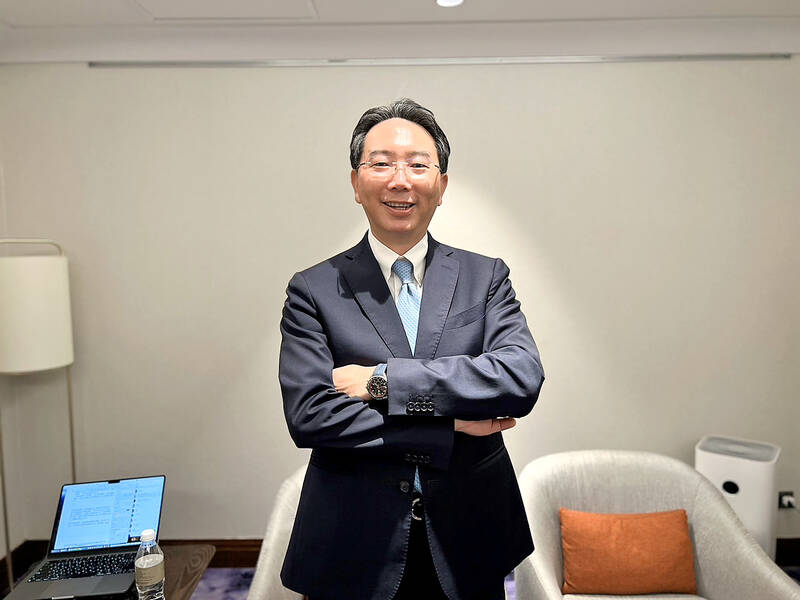Machinery maker Hiwin Technologies Co (上銀科技) forecast business would resume growth from next year after posting flat revenue growth this year, as market demand showed signs of recovery, company chairman Chuo Wen-heng (卓文恒) said yesterday.
The company saw a marked improvement in the number of visitors to the Japan International Machine Tool Fair last week and the order visibility for some Japanese machine tool makers has slightly improved compared with the previous year, Chuo told an earnings conference in Taipei.
Chuo said he had observed a relatively optimistic sentiment for the machine tool industry this year, as exhibitor attendance at the trade show seemed to be back to pre-COVID-19-pandemic levels.

Photo: Lin Jin-hua, Taipei Times
He also has a positive outlook for the US market after the US presidential election last week, as the US Federal Reserve is likely to continue its interest rate cuts, which is expected to support market demand and result in more orders for machine tool makers, he said.
Chuo said he also sees signs of improvement in the domestic market, based on the latest machine tool export data and feedback from members of trade associations.
Several machine tool makers have shifted focus to high-end product development and gradually produced components used in end applications such as semiconductor equipment, he said.
Hopefully, next year would be better than this year for Taiwan’s machine tool industry, he added.
However, the European market has slowed, with the German machine tool market particularly under pressure as the country’s automobile industry takes a hit from Chinese electric vehicles, Chuo said.
Meanwhile, the Chinese market is recovering, but visibility remains unclear, depending on the US tariff policy of US president-elect Donald Trump, he said.
In China, which contributes about 40 to 45 percent to Hiwin’s sales, order visibility is about two to 2.5 months, mainly for rush orders, he said.
While the company’s shipments to China remain steady from month to month, it is difficult to see order visibility as far out as six to eight months, he added.
Hiwin — which supplies linear guideways, ball screws, bearings and industrial robots — yesterday posted its best profit in eight quarters as its revenue continued to improve.
Net profit was NT$664 million (US$20.48 million) in the third quarter, up 14 percent quarter-on-quarter and 5 percent year-on-year, while earnings per share was NT$1.88, the highest since the third quarter of 2022, the company said.
Revenue last quarter was the highest in four quarters at NT$6.33 billion, it said.
In the first three quarters, net profit decreased 3.5 percent year-on-year to NT$1.64 billion, or earnings per share of NT$4.64, while total revenue fell 4.5 percent to NT$18.02 billion, it added.

Semiconductor business between Taiwan and the US is a “win-win” model for both sides given the high level of complementarity, the government said yesterday responding to tariff threats from US President Donald Trump. Home to the world’s largest contract chipmaker, Taiwan Semiconductor Manufacturing Co (TSMC, 台積電), Taiwan is a key link in the global technology supply chain for companies such as Apple Inc and Nvidia Corp. Trump said on Monday he plans to impose tariffs on imported chips, pharmaceuticals and steel in an effort to get the producers to make them in the US. “Taiwan and the US semiconductor and other technology industries

SMALL AND EFFICIENT: The Chinese AI app’s initial success has spurred worries in the US that its tech giants’ massive AI spending needs re-evaluation, a market strategist said Chinese artificial intelligence (AI) start-up DeepSeek’s (深度求索) eponymous AI assistant rocketed to the top of Apple Inc’s iPhone download charts, stirring doubts in Silicon Valley about the strength of the US’ technological dominance. The app’s underlying AI model is widely seen as competitive with OpenAI and Meta Platforms Inc’s latest. Its claim that it cost much less to train and develop triggered share moves across Asia’s supply chain. Chinese tech firms linked to DeepSeek, such as Iflytek Co (科大訊飛), surged yesterday, while chipmaking tool makers like Advantest Corp slumped on the potential threat to demand for Nvidia Corp’s AI accelerators. US stock

The US Federal Reserve is expected to announce a pause in rate cuts on Wednesday, as policymakers look to continue tackling inflation under close and vocal scrutiny from US President Donald Trump. The Fed cut its key lending rate by a full percentage point in the final four months of last year and indicated it would move more cautiously going forward amid an uptick in inflation away from its long-term target of 2 percent. “I think they will do nothing, and I think they should do nothing,” Federal Reserve Bank of St Louis former president Jim Bullard said. “I think the

‘LASER-FOCUSED’: Trump pledged tariffs on specific sectors, including semiconductors, pharmaceuticals, steel, copper and aluminum, and perhaps even cars US President Donald Trump said he wants to enact across-the-board tariffs that are “much bigger” than 2.5 percent, the latest in a string of signals that he is preparing widespread levies to reshape US supply chains. “I have it in my mind what it’s going to be but I won’t be setting it yet, but it’ll be enough to protect our country,” Trump told reporters on Monday night. Asked about a report that incoming US Secretary of the Treasury Scott Bessent favored starting with a global rate of 2.5 percent, Trump said he did not think Bessent supported that and would not